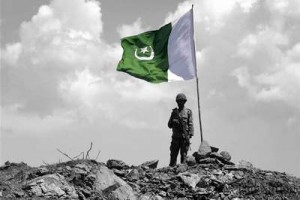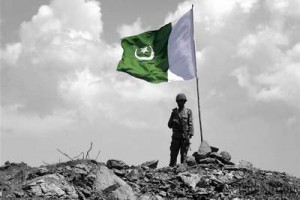Arab News
MUHAMMAD WAQAS
 As Pakistan enters into the final phase of its military offensive against terrorism, there are already welcome signs that civil-military leadership is setting the base for greater cooperation in security matters.
As Pakistan enters into the final phase of its military offensive against terrorism, there are already welcome signs that civil-military leadership is setting the base for greater cooperation in security matters.
Media sources have reported a rare meeting between Prime Minister Nawaz Sharif and Pakistan’s military chief Raheel Sharif, accompanied by the head of country’s premier spy agency ISI, to discuss “issues related to the military.” The confidential nature of this meeting has stirred many speculations as key members of the government, and even the previously much larger military delegation, were conspicuously left out.
While the meeting expressed satisfaction over the significant progress made against terrorism, they have stated the need to intensify intelligence-based operations across the country as part of the post-offensive plans. By escalating intelligence-based activities, the leadership is hoping to dismantle the infrastructure of terrorists and consolidate gains of military operations for long term stability in the country. To a large extent, the focus of intelligence operations would be on targeting facilitators of terrorists and ensuring that the insurgents are not able to regroup in the cleared areas of North Waziristan.
The role of law-enforcement agencies to lead counterinsurgency operations in urban areas and support intelligence agencies in thwarting evil designs of the terrorists would also be crucial. It is imperative that these security agencies are fully engaged in the process of National Action Plan (NAP) implementation and understand their responsibility to keep a check on militancy, sectarianism and the presence of banned outfits in different areas of the country. To sustain Pakistan’s momentum against terrorism, the civilian and military intelligence agencies must closely cooperate to get further positive results. Another factor playing on the mind of PM Sharif would be the looming retirement of Gen. Sharif next year.
The architect of Pakistan’s aggressive military campaign to root out terrorism, the Pakistan Army chief has declared his intention not to seek an extension in his tenure. Besides his accomplishments in the war against extremism, Gen. Sharif has been able to strengthen the military’s influence in matters of foreign and national security policy, and also pushed for reconciliation between the Afghan government and Taliban. In the coming months, PM Sharif is expected to closely work with Gen. Raheel to appoint his successor to keep the pace of Operation Zarb-i-Azb in its next critical phase.
Pakistan’s civilian and military leaderships are also likely to pressure the Afghan government for effective border management and return of Afghan refugees from the host country. Since the start of this year, there has been an uptick in the number of terrorist attacks and civilian casualties across the country. Pakistan has already shared forensic evidence with the Afghan government that Charsadda attacks on a university earlier this year were masterminded in Afghanistan. Pakistan has demanded a targeted operation against those culprits, as it is clear that lasting peace cannot be achieved in the region until the Afghan counterparts eliminate militant sanctuaries along the rugged Afghan-Pakistan border.
In this backdrop, Pakistan will be looking to deepen its security-related partnership with Afghanistan and preempt internal and external threats to the country. The success of Pakistan’s final push toward peace and stability hinges on the engagement of civil-military leadership and other regional stakeholders.




